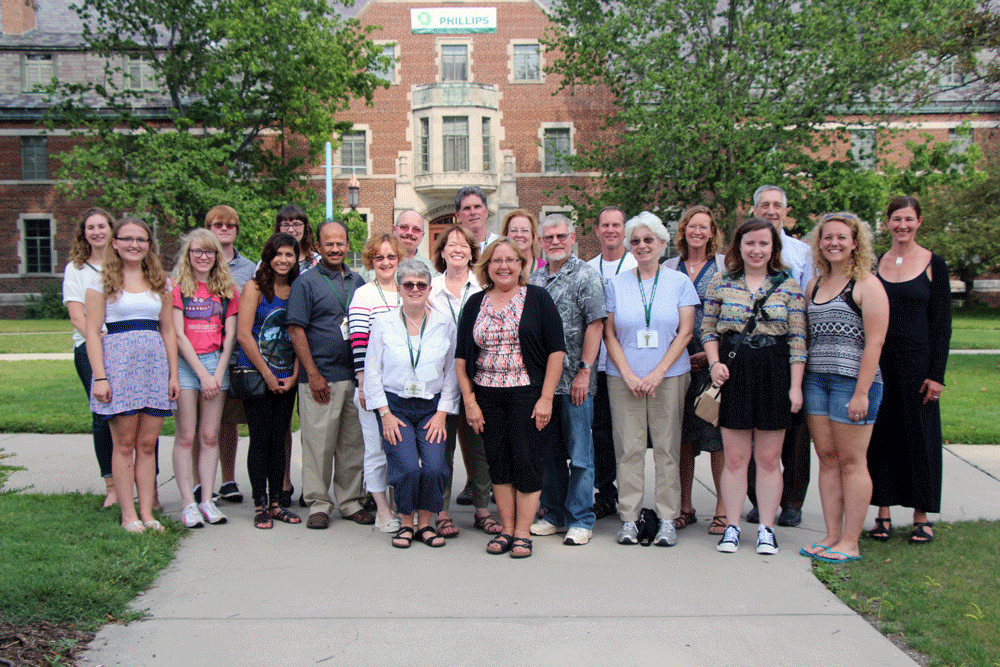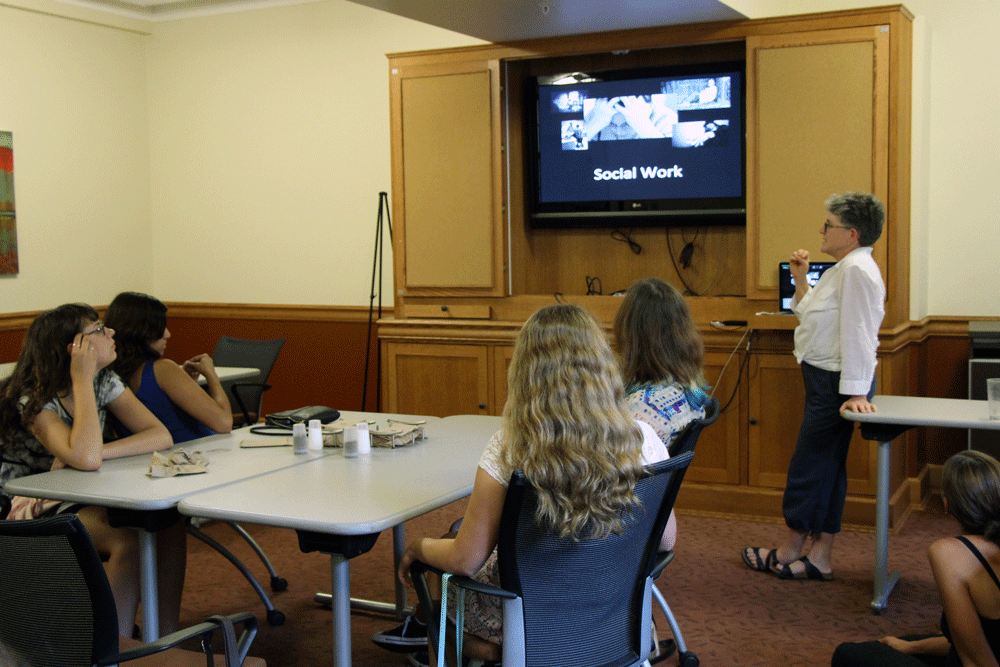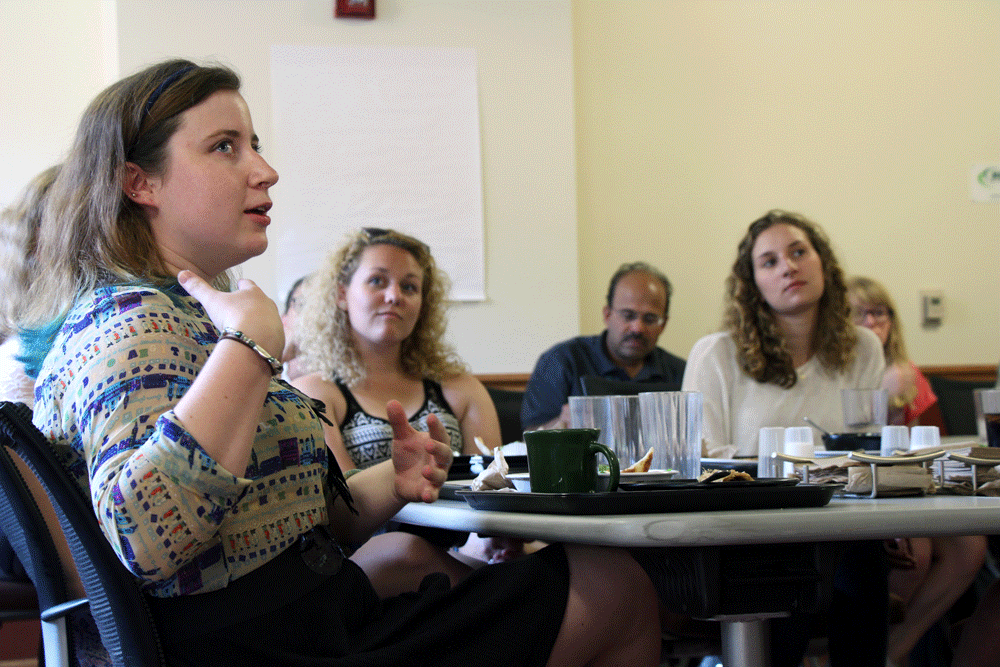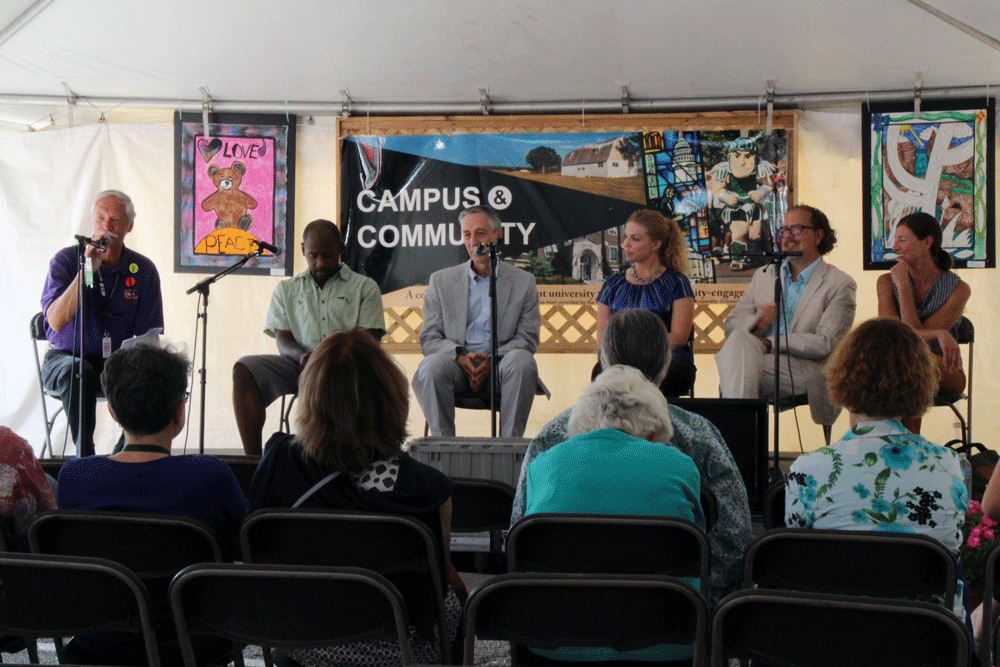Message from the Dean: Parents College and Educating Humanity
August 16, 2014
Parents College is a three-day, 14-hour a day, immersion program for 10 to 15 parents and friends of RCAH in August, culminating in a final dinner and colloquium with 10 RCAH students. We take on difficult subjects (for example, sacrifice, forgiveness, or humanitarian assistance). We read, discuss, compose, and present in a variety of media, from fabric art to theatre to photography. In traditional RCAH fashion, we live our learning in Snyder-Phillips Hall, and finish with a banquet in which RCAH students join parents and friends to talk about the projects the Parents College participants have made during this intensive and intense program.

The night before the third annual RCAH Parents College began on August 8, several lead stories dominated the news that spoke directly to our topic this year: humanitarian assistance. In addition to the continuing concern over children from Central America struggling to make their way across the US border, the Ebola virus outbreak in West Africa and the advance of jihadist militias against Kurdish troops and Iraqi civilians were declared humanitarian crises by President Obama.
How should we respond to such crises? The President and others have argued that there was no direct conflict between humanitarian and national security interests. In West Africa, the right humanitarian thing to do is to provide medical assistance to those in dire need of it, and by doing so, we protect ourselves from the spread of this deadly disease. Similarly, military assistance to the Iraqi government and the Kurdish regional government could and should be provided at the same time that food and water could and should be airlifted to those civilians desperately fleeing jihadist forces hostile to the government and to ethnic minorities such as the Yazidis.
Unfortunately, national interests and humanitarian interests don’t always converge cleanly. One could argue that the conflict in Iraq is part of an Iraqi civil war, and the US should not get caught in the cross-fire. From this perspective, our national interests and humanitarian interests conflict with one another. In the case of Ebola, a critic might argue that there could be a danger of compromising our national interests if the medical assistance included transporting those who contracted the disease and allowing them back in the US for treatment.
These are some of the issues we began with in Parents College this year. But before they can be settled, the basis of humanitarian interests has to be clarified. Here’s where ethical reflection and public policy considerations come together. Are humanitarian interests in aiding the victims of persecution and the victims of pandemics a matter of charitable giving (those who have the resources to give ought to give to those who need them)? Or, should we provide humanitarian assistance to the degree we are able, but no more? Michael Walzer’s answer to this question is “both”: we should give as much as we can and we should give to those who need help. (Foreign Affairs, July/August, 2011)
Many of our conversations in Parents College came back to this both/and formulation. What exactly do those in need actually need? What do the haves owe to the have-nots? If the answer is empowerment or capacity building, as the Parents College participants often said it is, how do we measure such things and how do we redistribute or share them?


For example, if what is needed is an empowering education, not merely a school building or a body of knowledge, who can provide this and how should they do it? It is not the same as transferring income, wealth, medical supplies, or military weapons. Empowerment and ability don’t come packaged for transfer the same way bundles of food and medicine do. This problem is something we wrestle with constantly in the RCAH, and not just in our civic engagement courses devoted to improving the quality of public education, but certainly there as well. Empowerment and capacity are relational, not divisible goods, especially the power one has to learn about the world and develop one’s talents and skills. One’s educational needs and one’s ability to meet them depend upon relationships to fellow teachers and learners.
One might say that to each according to his or her need, from each according to his or her ability applies to all of our RCAH activities, both formal and informal teaching and learning. Our Language and Media Center student consultants must figure it out. Our new language mentors must figure it out. Our faculty must figure it out. Our students working with their community partners in civic engagement classes must figure it out. It is this reciprocity that active, experiential learning strives for in RCAH.

Parents College participants attended an Art@Work panel discussion at the Great Lakes Folk Festival’s Campus and Community Stage. Art@Work is an ongoing collaboration with local non-profit organization Peckham, Inc., the RCAH, and College of Engineering.
One of the goals of Parents College is to satisfy the hunger that RCAH parents have to partake of the education that their children tell them they have enjoyed in RCAH. How often have I heard from these parents: “If this were only here when I was an undergraduate…”? Parents College gives them the opportunity to re-live their learning, briefly but intensively. Parents College this summer offered an additional benefit. As we discussed the grounds for humanitarian assistance, locally and globally, we came to realize that the conjunction of needs and capabilities applies to more than just emergency relief efforts. It is a useful rule for thinking about our asymmetrical relationships to others in general. When we are in need, we look to those who have the knowledge and skills to empower us. When we enjoy certain advantages, we can look to those in need to share our resources with them. This is not a comforting fiction, nor is it logistically impossible when it comes to empowerment and capacity building. It is how our educational practice in the RCAH has evolved over seven years. It is time to ask, as our parents have, where else can we apply this approach to our basic needs and capabilities?

